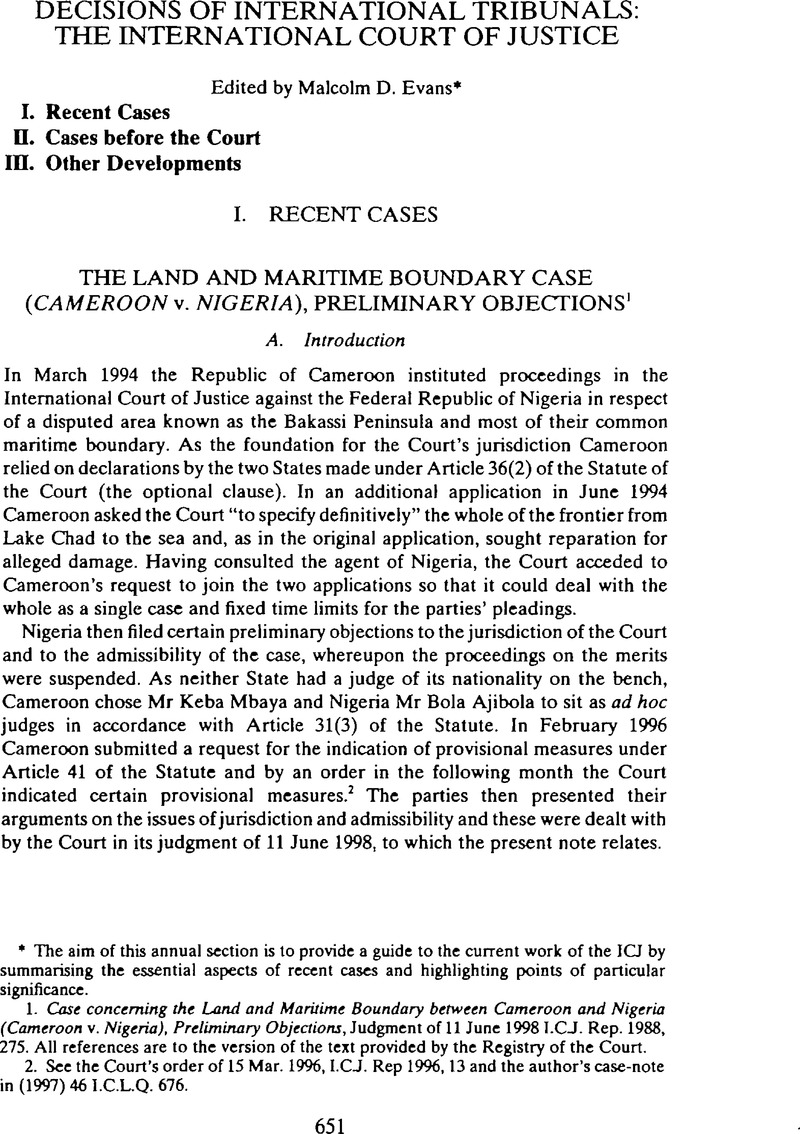Article contents
I. The Land and Maritime Boundary Case (Cameroon v. Nigeria), Preliminary Objections
Published online by Cambridge University Press: 17 January 2008
Abstract

- Type
- International Court of Justice: Recent Cases
- Information
- Copyright
- Copyright © British Institute of International and Comparative Law 1999
References
1. Case concerning the Land and Maritime Boundary between Cameroon and Nigeria (Cameroon v. Nigeria), Preliminary Objections, Judgment of 11 June 1998 I.C.J. Rep. 1988, 275. All references are to the version of the text provided by the Registry of the Court.Google Scholar
2. See the Court's order of 15 Mar. 1996, I.C.J. Rep 1996, 13Google Scholar and the author's case-note in (1997) 46 I.C.L.Q. 676.Google Scholar
3. Right of Passage over Indian Territory, Preliminary Objections, Judgment, I.C.J. Rep. 1957, 125.Google Scholar
4. Judges Weeramantry, Koroma and Ajibola voted against the judgment on this issue and delivered dissenting opinions in which they endorsed the arguments put forward by Nigeria and mentioned in the text.
5. Judgment, para.25.
6. See Temple of Preah Vihear, Preliminary Objections, Judgment, I.C.J. Rep. 1961, 17 at 31Google Scholar and Military and Paramilitary Activities in and against Nicaragua (Nicaragua v. U.S.A.) Jurisdiction and Admissibility, I.C.J. Rep. 1984, 392.Google Scholar
7. The Court added that apart from the fact that Cameroon was under no obligation to inform Nigeria of its intention to begin proceedings, Nigeria was in reality “not unaware of Cameroon's intentions” (Judgment, para.40).
8. Judgment, para.43. The quotation is from I.C.J. Rep. 1984, 419, para.62.Google Scholar
9. Judgment, para.66.
10. Only Judge Koroma voted to uphold the second objection and was joined by Judge Ajibola in upholding the third objection.
11. For further discussion of this point see Merrills, J. G., International Dispute Settlement (3rd edn) (1998), pp.233–238 and 276–280.Google Scholar
12. I.C.J. Rep. 1954, 19.Google Scholar
13. I.C.J. Rep. 1995, 90.Google Scholar
14. Judges Oda, Koroma, Para-Arranguren and Ajibola voted against the judgment on this point, but only the last two discussed the issue in any detail.
15. See the Burkina Faso/Mali Frontter Dispute, Judgment, I.C.J. Rep. 1986, 554, 577, para.46.Google Scholar
16. Judges Oda and Koroma also voted against the judgment on this point, but did not discuss it explicitly in their opinions.
17. Judgment, para. 116.
18. Judges Oda, Koroma, Vereschetin and Ajibola voted against the judgment on this point.
19. Judges Oda, Koroma, Kooijmans and Ajibola joined Judge Higgins in voting against the judgment on this point.
20. Judges Koroma and Ajibola voted against the judgment on this point, but only the latter discussed the point in his opinion.
21. In the last section of the dispositif the Court, having voted on the various objections individually, held by 14 votes to 3 that it had jurisdiction to adjudicate upon the dispute and by the same majority that the application was admissible. Judges Weeramantry, Koroma and Ajibola constituted the minority on both issues.
22. Request for interpretation of the Judgment of 11 June 1998 in the case concerning the Land and Maritime Boundary between Cameroon and Nigeria (Cameroon v. Nigeria). Preliminary Objections (Nigeria v. Cameroon), judgment of 25 Mar. 1999. The text is based on the information to be found in the Court's press communiqué of the same date, 99/14 bis, obtained from the Internet.
23. See the Request for Interpretation of the Judgment of 20 Nov. in Asylum case, Judgment I.C.J. Rep. 1950, 395Google Scholar, where the request was denied, and the Application for Revision and Interpretation of the Judgment of 24 February 1982 in the case concerning the Continental Shelf (Tunisia/Libyan Arab Jamahiriya) (Tunisia v. Libyan Arab Jamahiriya), Judgment, I.C.J. Rep. 1985, 192Google Scholar, where it was granted. For a review of the issues raised by Art.60 see Merrills, J. G., “Reflections on the Incidental Jurisdiction of the International Court of Justice”, in Evans, M. D. (Ed.), Remedies in International Law: The Institutional Dilemma (1998), p.51.Google Scholar
- 4
- Cited by


